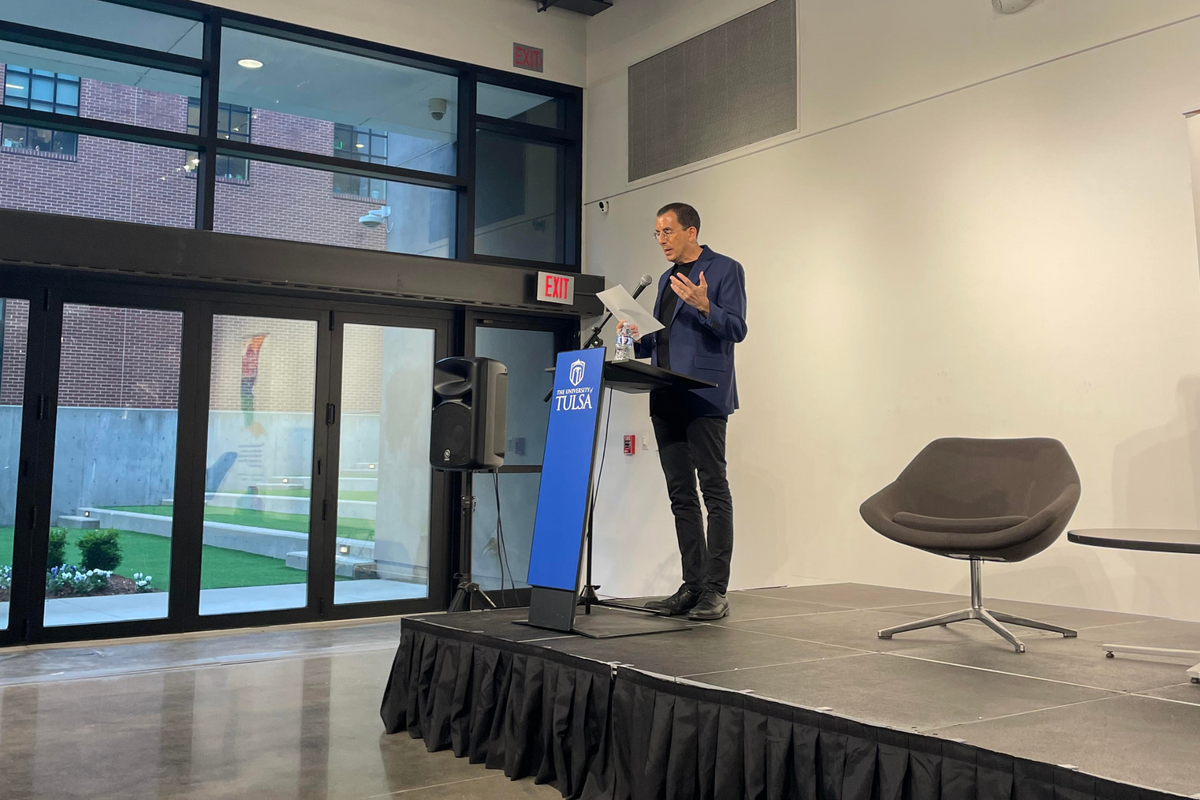Tulsa
How To Capture The Uncapturable (In Sports, Music & Everything In Between)
by | Apr 25, 2024 2:01 pm
Post a Comment | E-mail the Author

CASSIDY MCCANTS PHOTO
Carlo Rotella at the Oklahoma Center for the Humanities
“Knockout Punches and Barroom Weepers: Writing About Sports and Music“
101 Archer
April 18, 2024
What do music and sports have in common? They defy words, for starters — an irony not lost on Carlo Rotella, a New York Times Magazine writer, Boston College professor, and award-winning author of books about cities, boxing, and blues.
Last Thursday was a windy night downtown. As Nicole Bauer, associate director of the Oklahoma Center for the Humanities, introduced Rotella, a gust hit the courtyard of 101 Archer, coming in just powerful enough to rustle even the most stalwart, perfectly manicured hedge. That strong current of air seemed like an appropriate welcome into his talk: this year’s theme at the OCH, after all, is “movement.”
Rotella thinks of bodies moving in space (for instance, boxing) and sounds moving in time (music) as nonverbal events, like landscape and sex. Why, then, do we try to write on them? Because even though they’re resistant to description, they offer truth and beauty and a “distraction from the pain of being.”
Rotella was tasked with equipping our fairly small crowd (12 or so — Anne Lamott was in town that night too) with a few cautions, principles, and purposes for writing about such word-resistant topics. How do you explain the senseless act of hitting when, as he said, “hitting just wants to be hitting”? People want meaning, want sense, but can you beautifully and freshly describe a knockout? Can you avoid clichés in music writing? We only have so many words; we have to depend on jargon, to some extent, but also walk the line between precedent and cliché, between the technical and the figurative.
Sports readers are more tolerant of the technical, Rotella explained, while music writing is better suited to the figurative. Often, when we write about music, we’re actually writing about other things — like a poet or fiction writer, we use small-picture details (like a vocalist’s inflection) to discuss the big picture (the effect of blues on rock and roll, for instance).
In music and sports writing, Rotella sees the objective as describing, not critiquing, what someone did (e.g., “threw a punch,” “soared through the chorus”). In other words, capturing the movement. The tough part is that what really matters to people about these acts doesn’t want to be captured by words. In boxing, force trumps sense. In music, we ask for authenticity, but why? And what does it mean? Rotella’s argument is that it’s all about getting “partially there,” offering up some clarity and reason and meeting the reader where they are.
I tend to be hesitant when it comes to intellectualizing writing, this thing I’m doing here, now. But intellectualizing isn’t all bad, and it’s important to consider why trying to capture the uncapturable (aka arts writing) matters. While this OCH event was pretty academic — Rotella is a professor and fit the part, reading directly from his paper — it was fun to dive into the process behind this kind of prose, and it’s a nice meta prospect to write about someone’s writing on writing.
Rotella focused on music and sports, but it seems to me that any kind of writing about a particular thing a person or group is doing in front of — or has created for — people runs into the same problems and perks. It’s always the ineffable things we want described, or at least halfway described via a mix of analogy and concrete details. And what I love about experiential writing is that it urges you to consider everyday life — like an academic talk on a Thursday night — as art in motion. Or, should I say, art in movement: a bunch of ideas and bodies in space bumping along, borrowing from one another and making meaning where we can.
On display now at 101 Archer: “Harmony of Duality: A Two-Spirit Journey” + “We Protest – A New Exhibit”